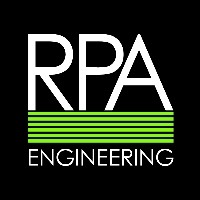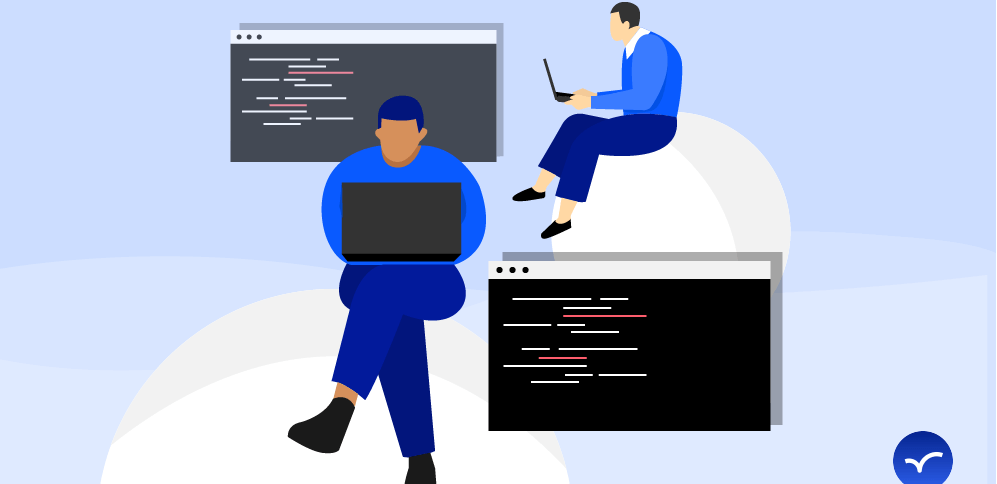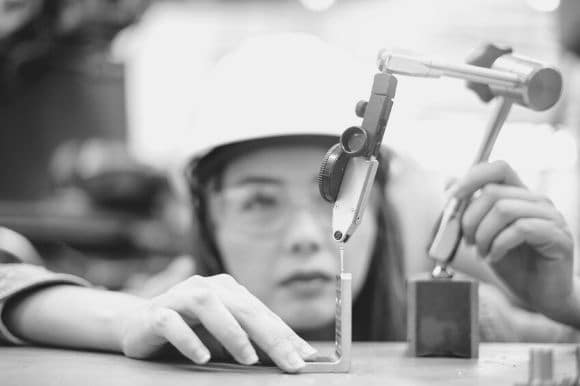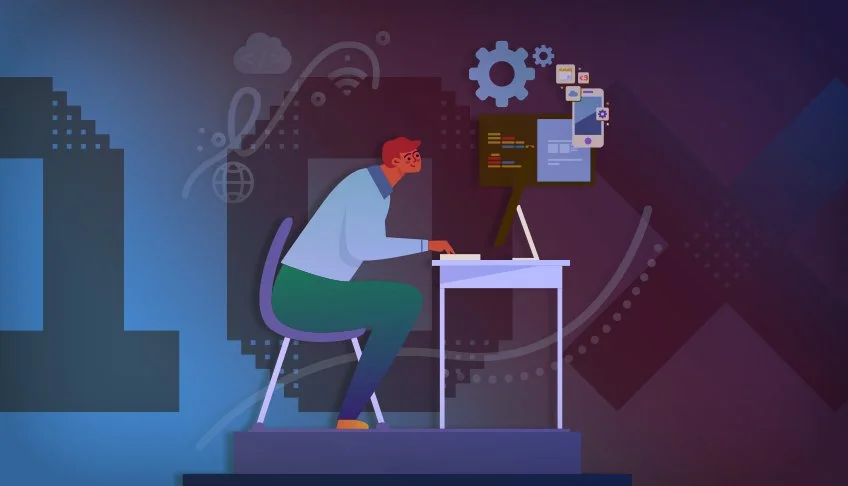In recent years, the demand for RPA engineers who develop and operate RPA (Robotic Process Automation), which has become pervasive, is steadily increasing, partly because companies are seeking to improve business productivity. On the other hand, some say that the conditions for hiring have become stricter, raising the hurdles for becoming an RPA engineer.
It’s been more than two years since RPA was introduced in earnest in Japan, and with the increasing number of introduction cases, how have the knowledge, skills, and work content required of RPA engineers changed? Here, we will explain the skills and future potential required to be active while touching on the basics of RPA engineers.
Related Articles>> [How is it different from freelance? ] Advantages and disadvantages of engineers working as nomads
What is an RPA engineer?
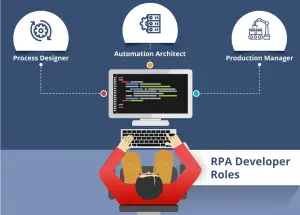
RPA refers to software-type robots that automate routine office work and related technologies and concepts. Of the clerical work that has been done by humans so far, by automating the tasks that can be routinized and processed mechanically (= routine work) by robots, we will continue to solve the labor shortage that will continue due to the declining population. It will be possible to shift and concentrate valuable human resources on higher value-added work. RPA engineers are responsible for implementing and developing this RPA.
RPA = technology and concept for automating work
RPA is the name of a technology/concept that automates work and a software robot designed based on it, and processes various tasks, including back-office white-collar work, on behalf of humans. Therefore, it is also called a virtual intellectual worker = Digital Labor.
There are Class 1 to 3 stages for work using RPA.
・Class 1 (RPA = Robotic Process Automation)
It supports routine work and simple work that requires application linkage and is used for back-office clerical work and expense processing.
・Class 2 (EPA = Enhanced Process Automation)
It supports data collection and analysis. Equipped with functions to process unstructured data and knowledge, it is possible to perform non-routine tasks such as log analysis and multi-factor sales forecasting.
・Class 3 (CA = Cognitive Automation)
It is RPA equipped with autonomous judgment. AI-equipped software robots learn through deep learning, analyze big data, perform individual optimization processing, make decisions on the fly, and make decisions. For example, it is possible to make sales forecasts and production instructions based on various information such as weather, social phenomena, news, and stock prices.
RPA engineer job description
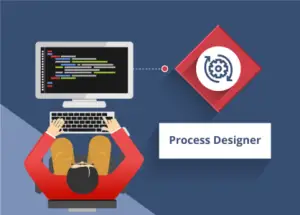
RPA engineers mainly have three roles: consultant, robot/scenario construction, and maintenance/operation.
RPA Consultant
We will conduct interviews (surveys) with clients, cut out work that can be RPA, and make proposals. It also includes making proposals that lead to business improvement and resolution of management issues (BPR = Business Process Re-engineering).
It is important to accurately grasp the client’s issues and requests and connect them to proposals. RPA consultants will handle a wide range of RPA implementations, including hearings, implementation support, and post-implementation expansion of the scope of application and reporting of results.
Furthermore, when it comes to upstream RPA consulting, in addition to the above work, governance establishment, project operation rule construction, various standardization (development standards, etc.), CoE (Center of Excellence) system construction, user development (EUC = End User Computing) system construction, etc.
Depending on the size of the client and the project, there are cases where the RPA engineer and RPA consultant are separate or concurrent.
Build a robot/scenario
Design and build robots/scenarios using RPA development tools.
Robots/scenarios built in the early days of RPA tend to be unstable, have many errors, and end up not being used because they are difficult to use. Many clients have problems with maintenance and operation. Not a few. Based on such introduction failure cases, companies newly introducing RPA are even more strongly demanding solidity. Therefore, it is necessary to make the output required by the client while considering maintenance and operation.
Whether or not the client can promote operational efficiency and reduce the burden as expected by the client depends greatly on this design and construction. Since the success or failure of RPA introduction depends on it, it is necessary to consider the operation pattern after an introduction from various aspects.
Maintenance and operation of constructed robots/scenarios
After introducing RPA and starting operation, it is one of the tasks of RPA engineers to respond to errors and defects when they occur. Even after the actual operation has started, there will be some parts that need to be modified due to changes in the business content and specification changes such as APIs used. Even in such cases, RPA engineers fix the robots/scenarios so that automation can continue, and solve any problems that arise.
We also create documents necessary for client troubleshooting, such as operation manuals for the introduced RPA. In addition, it also includes operational support work such as responding to inquiries from clients during operations, explaining operations, and educating users who use RPA tools. As the number of RPA introduction cases increases in the future, it is thought that the number of maintenance and operation tasks will increase.
Skills required for RPA engineers
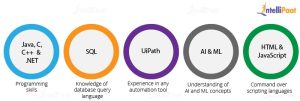
There are no required qualifications or conditions for RPA engineers yet, but there are some skills that it is desirable to have to carry out the work. Let’s look at them in order.
programming skills
Basic programming knowledge and skills are required to develop robots/scenarios. Since RPA tools are developed on the assumption that you have basic knowledge of programming, it is difficult to operate RPA tools without any knowledge.
The expression “RPA is easy”, which was often said in the early days of RPA, is not often heard today. RPA is a so-called low-code tool, and although it is a tool that allows development without implementing code, the essence of development does not change.
Experience and perspective on improving work efficiency using Access and Excel VBA
Before RPA, we used Access and Excel to streamline office work. These experiences and ways of thinking can be used as useful experiences as RPA engineers because they do not change as a basic part even if business efficiency shifts to RPA.
To improve operational efficiency, it is important to consider what should be prioritized and how to reduce the burden on end users. Since it is difficult to understand such a perspective until you experience it, the experience of improving work efficiency is important for RPA engineers.
The future of RPA engineers
Demand for RPA engineers is expected to continue to grow steadily in the future. There are primarily two causes for this.
Labor shortage due to population decline
Japan’s population is declining year by year, and the resulting labor shortage is becoming more serious. The population decline due to the declining birthrate and aging population is unstoppable, and Japan’s working population will continue to decline in the future. Therefore, improving productivity, improving operations, and reducing the burden on employees are urgent issues for companies.
Therefore, an increasing number of companies are exploring whether it is possible to improve the productivity of the entire company by introducing RPA and having robots replace the work that humans used to do. In addition, from the perspective of BCP, the substitution of RPA is considered to be very effective even in situations where it is difficult to secure personnel, such as in recent emergencies.
As the number of companies that introduce and operate RPA increases, repair and operation/maintenance work after the introduction will also increase, so it is thought that the demand for RPA engineers with technical skills and experience will increase.
Expansion of the RPA market
In addition to the declining population, it is expected that the RPA market will expand along with the technological development of RPA. RPA will step up from Class 1 to Class 2, and 3, and will be able to handle more complex requirements than ever before, so it will gradually spread to companies that have not yet introduced it. Along with the growth of RPA, it is expected that various skills such as high consulting skills for RPA introduction, RPA construction ability, wide-ranging knowledge, and communication skills will be required. In the future, it is thought that the demand for RPA engineers with such skills will increase.
What RPA Engineers Need to Add Value
What kind of RPA engineers are in demand? Here are five points that RPA engineers need to add value.
Ability to collect information that can catch information that is updated daily
The RPA market changes rapidly due to rapid technological innovation. It is important to have the ability to gather information to grasp the latest technological trends, such as updating RPA tools and the birth of new RPA tools, by increasing the sensitivity of information gathering regularly.
Ability to think and try other methods without being bound by a specific method
The functions, conditions, users, etc. required when introducing RPA are not the same at each site. The flexibility to think from various angles and try out implementation methods flexibly without sticking to RPA alone is a strength.
Ability to understand not only the skills of the tools to be developed but also the end-user operations to be improved/automated
If you do not understand the work to introduce RPA, you will not be able to properly improve or automate your work. By understanding the purpose of work, workflow, input/output, and issues and problems, you can increase your value as an RPA engineer who is close to ending users.
Ability to think closely with people involved in RPA projects other than yourself
There are a wide variety of people involved, such as members of the promotion department who want to promote the introduction of RPA, end users who want to automate their work, and people who will maintain and operate robots in the future. The ability to listen to the opinions and requests of other stakeholders and to consider their position and ideas will lead to a better introduction and promotion of RPA.
Gain knowledge and experience in OCR, AI, process mining, etc. that are compatible with RPA
These technologies tend to be included as functions of RPA tools, so they are also necessary for the sense of mastering RPA tools. In particular, the compatibility between AI and RPA is very good, and it is essential for RPA development which is categorized as Class 3, which is expected to grow in demand in the future. increases.
The demand for RPA engineers is increasing year by year!
RPA engineers not only create robots/scenarios using RPA tools, but also take charge of a wide range of tasks, from business efficiency consulting to companies that want to introduce RPA, to proposals, design, development, introduction, maintenance, and operation. Did you understand?
The demand for RPA engineers is increasing year by year, and it is said that the hurdles have become higher. If you are looking to the future and want to work as an engineer, please consider this as one of your options.
Visit the Facebook page Xtreme Techy if you’re ever interested in corresponding topics.
